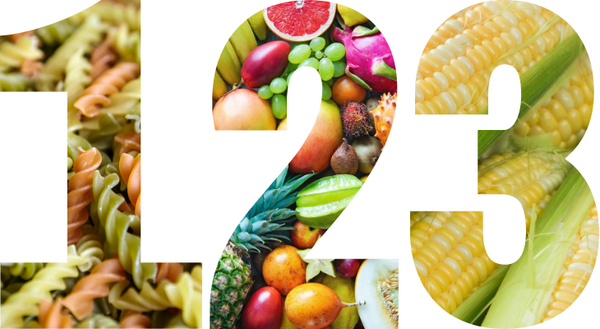
Diabetes will likely cause changes in your life and your food choices, but with proper care, most individuals with diabetes can take charge of their health. Making wise food choices to manage blood glucose will help prevent negative health outcomes such as heart disease, stroke, and kidney disease. However, making and knowing the right dietary choices for meals and snacks can be confusing.
The Exchange Lists were created by the American Diabetes Association and the Academy of Nutrition and Dietetics to help individuals with diabetes plan meals. The Exchange Lists can help individuals identify which foods have carbohydrates (carbs) and approximate how many carbs are in the foods they eat. Carb containing foods are grouped into starch, non-starchy vegetables, fruits, milk and milk substitutes, and other carbohydrates. The food items in these groups are similar in carbohydrate composition and can be “exchanged” for other items in the same group. The carb content of these groups along with examples and serving sizes are listed below.
Starch
Each serving size of starch is approximately 15 g of carb.
Example foods and serving sizes are:
- 3/4 cup unsweetened ready to eat cereal
- 1/2 cup sweetened cereal
- 1/2 cup hot cereal (plain)
- 1/3 cup pasta/noodles, rice, or beans
- 6 round butter crackers
- 3 cups of popcorn
- 1 oz of chips (handful)
- 1/2 cup corn or 4” corn on the cob.
- 1/2 cup mashed potatoes (made with milk) or sweet potatoes (no sugar added)
Non-starchy vegetables
Each serving size of non-starchy vegetables is approximately 5 g of carb.
Example serving sizes are:
- 1/2 cup cooked
- 1 cup raw
- 1/2 cup juice
Example foods are:
Tomatoes, peppers, cucumbers, green beans, eggplant, asparagus, squash, broccoli, brussels sprouts, cauliflower, and onions.
Fruit
Each serving size of fruit is approximately 15 g of carb.
A typical serving size is about 1/2 cup, a small fruit (apple, pear, tangerine), 1/4 cup of dried fruit, 17 small grapes, or approximately 1 cup of melon.
Milk and Milk substitutes
Each serving size of milk is approximately 12 g of carb and milk substitutes are approximately 15 g of carbs.
Serving sizes are:
- 8 oz cup of plain milk or milk substitute
- 6-8 oz cup of plain artificially sweetened yogurt
Other carbohydrates
Each serving size of other-Carbohydrates are approximately 15 g of carb AND one Fat exchange: 45 calories, 5 grams fat
This group is where you will find most of your dessert type foods. Typical serving sizes vary and it is best to check food labels or nutrition information on websites. The serving sizes are small because these foods are high in refined carbs like table sugar.
Sample serving sizes are:
- Cake, unfrosted, 2-inch square (1 oz)
- Cupcake, 1 small (1¾ oz) [2 carbs + 1 to 1½ fats]
- Cookie, chocolate chip, 2 cookies 1¼-inch width
- Fruit cobbler, 1/2 c (3½ oz) [2 carbs + 1 fat]
- Donut, muffin, 4 oz [4 carbs + 2½ fats]
- Ice cream, regular, 1/2 c [1 carb + 2 fats]
- Ice cream, no-added-sugar, 1/2 c
- Sherbet, sorbet, 1/2 c [2 carbs]
- Yogurt, frozen, regular, 1/2 c
- Yogurt, frozen, fat-free, 1/3 c [1 carb]
- Cake, plain, 1 (1½ oz) [1½ carbs + 2 fats]
How many carbohydrates you need at each meal is very individualized. Check with your doctor, certified diabetes educator, or dietitian before starting any new meal plan.
For more information on carbohydrate counting, register for our Carbohydrate Counting Basics Webinar on August 26th at 1:00 pm. This is a FREE webinar. Space is limited, so enroll now. For more information or to register, visit https://web.extension.illinois.edu/registration/?RegistrationID=22487 or call our Milan office at 309-756-9978.
For current nutrition information and up-to-date food preservation webinars, check out the University of Illinois Extension Nutrition & Wellness page.
Source: This post was written by Lindsey Kabat, dietetic intern, working with Kristin Bogdonas, nutrition and wellness educator, serving Henry, Mercer, Rock Island and Stark Counties.